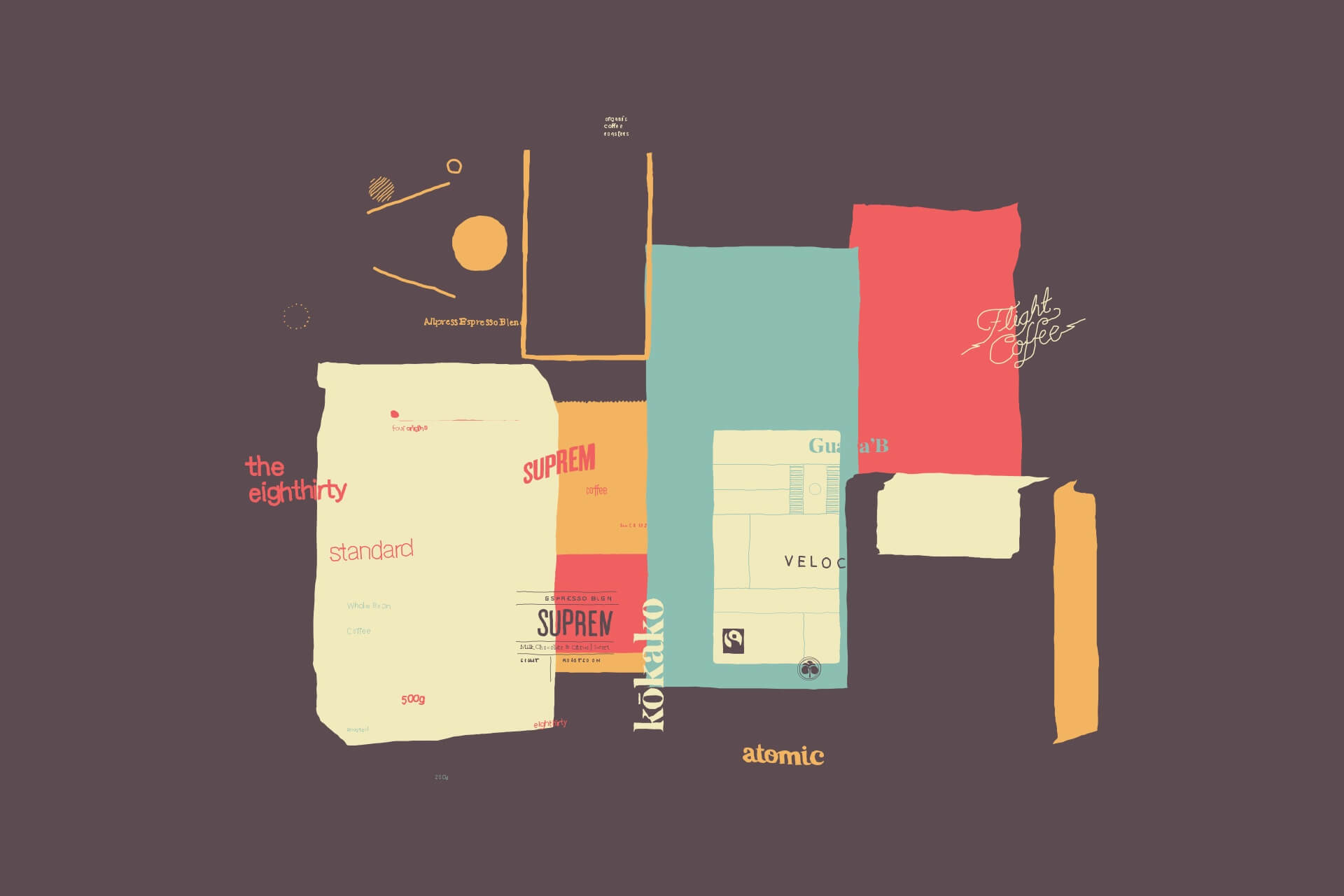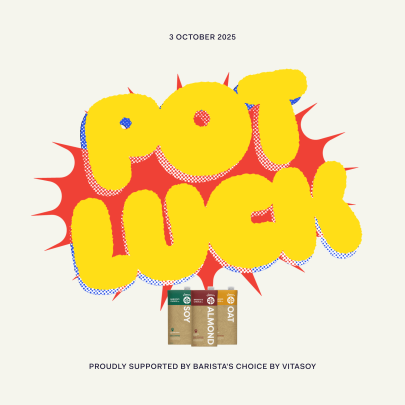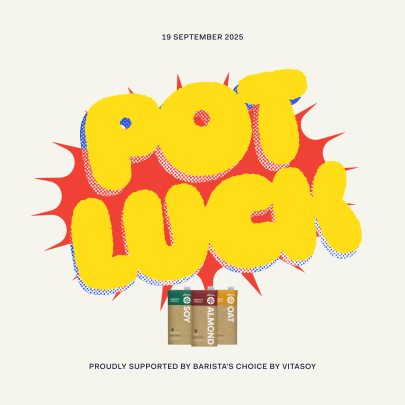Oct 2, 2022 Cafes
In May 2022, Wellington coffee roasters Havana opened a brand-new headquarters in Parnell — an open-door roastery decked in psychedelic-coloured graffiti. Inside, it’s huge, with carved-out arched windows set into a deliberately distressed internal wall, right above stairs that look poised for someone grand to walk down. It’s a result of about $2 million investment from Havana’s parent company, Lion — meaning more capacity to roast, and more capacity to take on and service new accounts in Auckland. The week it opens, teams from several other locally operated roasteries come by to have a look; one, we’re told, does a sneaky drive-by of the place at 10pm at night. Coffee roasters respect each other, sure. They’re friendly, supportive even — but in an industry as competitive as theirs, there can be tension brewing just beneath the surface.
New Zealand has the highest ratio of coffee roasters to population in the world. It means, one, that we roast really good coffee; and, two, that’s it’s a highly competitive market. And there are now added layers: both the pandemic and the global supply chain crisis have severely impacted hospitality and its suppliers. Along with the pains of see-sawing lockdowns, alert levels and traffic lights, the coffee industry is also widely reckoning with the significant price increases of green beans, its raw product, which has a notable flow-on effect to cafe owners and their customers. But despite all that, new cafes haven’t stopped opening up. And so, in the business of getting new business, the game continues.
About three years ago when I first met Al Keating, the then-CEO of Coffee Supreme (1), he’d told me about the data he’d been diligently tracking: how many accounts each roaster had on the Metro Top 50 Cafes list. For him, it’d become a measure of how well Supreme was doing; he’d even go so far as to wake up at 6am in the morning of release day, trotting along to the closest gas station to grab a copy. It soon became competitive, with Keating and his close friends at other roasters comparing cafes and notes. How many did they have this year? How many more, or less, than last year? It was clear, really, that Metro was adding fuel to the fire of an already fierce competition.
Hearing about this rivalry drew my interest to a part of the coffee industry I’d never thought much about before — how difficult it is to get your coffee into cafes; how much this impacts on the perception of your brand; and the kind of involved relationships you have to build with your customers. It’s a kind of relationship that seems to differ from the business of supplying other goods in hospitality. You wouldn’t ask your vegetable guy to help you out on your social media presence, would you?
Prior to writing this story, I’d noticed Flight Coffee, a roastery from Wellington, pop up in more and more cool cafes in Auckland (2) — the obvious being Williams Eatery , the best cafe in Auckland in 2020, but also Florets , which sells the best bread in Auckland in 2022. (Flight and Ozone Coffee Roasters , the New Plymouth company who made a big splash in Auckland when their big and beautiful Grey Lynn site opened in 2019, are the two I’ve been seeing more and more in the last year.)
Nick Clark, one of Flight Coffee’s directors, told me that he moved up to Auckland in 2018 to meet demand, growing from about six accounts in the northern region (Tāupo and up) to approximately 40. After selling 70% of their company to Nomad Coffee Group (an Australian-based business) a few years ago, Flight’s had the capital to think bigger, with the expansion to Auckland (3) and a few more macro projects, like its partnership with Breville, as well as innovating and diversifying its product range. “Nomad’s about 30 times the size of us in terms of scale, and they’ve got so much more experience.”
Flight sees its major differentiation in how they source their beans, since it also operates a social enterprise called Raw Material that deals with growing, process- ing, exporting and importing, and aims to offer stable pricing as opposed to the more volatile commodity pricing. This ethical focus has been folded into its brand identity — something that’s key for all roasters, especially when they’re more or less selling the same thing.
Though the first thing every roaster will look for in accounts is volume, sometimes roasters will put their coffee into outlets that they know won’t necessarily deliver in volume, but are a good fit for the brand. These cafes — which might be doing something different, serving an audience the roasters want to sell to, or have an owner with a big social-media profile, maybe — act as loss leaders (4). “If something like that comes up, you do what you need to do in order to get them. Them being a loss leader would provide other business,” someone in the coffee industry told me (5). Doing what you need to do could include shelling out for pricey equipment. “In the drinks [alcohol] industry, you’d go in prospecting and just better the deal, and it’s a week of chats — maybe a month tops. This industry, for some reason, you have to throw 30, 50 grand worth of machinery at somebody at no cost. And you have to be friends with them all. It’s very peculiar.”
Being friends with them all seems to be the trick. Coffee is emotional, and for roasters, a lot of their customers come from repeat clients — people they’ve developed relationships with for years. “We’re now working with people on their second, third or fourth cafe because they had a good relationship with us seven years ago. You just build your own ecosystem just by being good at what you do,” Mike Murphy, the managing director at Kōkako, told us. “It’s not easy [to get people to switch roasters],” Clark says. “For example, a lot of the older cafes in Auckland have been around a while, they work with Allpress and they probably know Michael Allpress quite well. That’s hard to get in there. You’re talking about busting up potentially personal relationships.”
The relationships become personal, fast, because of all the extra work that gets done beyond just supplying the coffee (6). To make sure their accounts succeed, roasters will do all sorts of things (7), including (but not limited to): looking at and giving advice on business models; budgeting and costing spreadsheets; social media training; branding; menu redesigning; trend forecasting; rearranging display cabinets; and painting walls before opening day — alongside the more run-of-the-mill account managery stuff, like servicing and barista training. “We’re not business mentors, or business coaches, but we can add some value, definitely,” Clark said, wryly.
Account managers can sometimes also act as emotional support for cafeowners, especially during a pandemic. “When a really good account manager comes in, you don’t even want to talk about coffee. You want to talk about Covid fatigue and how many staff have been off and how your work–life balance is terrible, or whatever. We provide value in ways that a lot of people wouldn’t expect, just by being good humans, and having a vested interest in their wellbeing,” Murphy said. I tell everyone I talk to that this a) seems wild, and b) certainly isn’t common knowledge, despite how blasé they may be about it.
Roasters put in this personal effort because their success and the success of their cafes are very much related; there’s a symbiotic relationship. So it’s also not rare for a roastery to turn a potential customer away. “The opportunities that we pursue can often be two years between when we first meet someone and when a cafe opens,” Murphy said. “It’s not someone Googling, you know, ‘Auckland’s best coffee’, and then ringing through and asking for pricing a few weeks before they open, like maybe they would with a cold beverage or something like that. A lot of people are thinking about their roaster before they even open — before there’s even a building there.”
Allpress, which dominated Auckland’s market for most of the 1990s and some of the early 2000s, currently has the most cafes on our Metro Top 50 Cafes list, last run in 2021: 10 accounts, with Supreme not far behind them at seven (8). Allpress recently sold to Asahi Breweries for an undisclosed amount that’s reportedly north of $50 million (9). It comes around the same time as a few other shake-ups in the industry: Atomic Coffee Roasters, which was previously owned by Suntory, was recently acquired by UCC Holdings after Suntory Coffee Australia sold its coffee arm; Coffee Supreme was sold to Pioneer Capital, a New Zealand-based investment company; and Eightthirty recently sold to Mojo Coffee (10). “I’m surprised it hasn’t made anything more challenging for us,” Murphy from Kōkako said. “Mike Allpress worked really hard for a long time, and so he obviously made an informed decision on who he sold to, and that’s his discretion… I think about it a lot, and I suppose what we always have to remember is that the people working in those organisations are always part of our economy, our ecosystem. If a company sells to a big offshore player, that could actually benefit our industry, because they may invest more money into refurbishment — like Havana. Maybe there’s a benefit here. Even though it’s gonna put pressure on us.”
The concept of ‘prospecting’ in the coffee industry can be a touchy subject. It’s like someone trying to chat up your man, I guess — though you have faith in your relationship, there’s always a part of you that wonders (11). “There have been times where we’ve been called aggressive. That’s because we’re just asking for business. I don’t find that aggressive,” Clark laughs. “Sometimes we’re just in a space because we enjoy it, and you start having a conversation. And we’re like, so how’s the coffee going? And they may go, ‘Oh, yeah, it’s all right.’ And we’re like, ‘Well, we can do better than that’.” JD Coulter, the business development manager at Allpress, agrees, again, it’s all about that r-word: “I’ll go in and talk to them and strike up a relationship with them as well — and you know, so will the other guys. And it’s not about trying to say these other guys are no good, or anything; I just believe in what Allpress can do, and what Allpress’s support is. And it’s not an easy thing to do. Usually if something’s going to open, they’ve either made up their mind as to who they’re going with, or who they’re going to reach out to.”
On the other side of things, Kōkako says they generally look for greenfield or brownfield development sites. “I’ve always tried to set a standard for our whole company of respect and integrity. Zoe [Fawcett, Kōkako’s business development manager] and I would much rather prefer to work with an operator rather than hustle and take someone else’s business (12), because it’s not growing the market — it’s not growing the economy. We look across New Zealand and go, where are the new subdivisions? Where’s the growth?”
A couple of roasteries didn’t want to talk to me, perhaps worried about what this story might say — no one wants to look like the bad guy, or to be perceived as doing something bad, especially by their gossipy peers. But I mostly ran into people who loved what they do, are passionate about the industry, and, frustratingly, respected what everyone else on their level was doing, because it pushed them to be better. (Perhaps there was also a healthy dose of paranoia as to what everyone else was up to.) We’re lucky to have the coffee we do here in Tāmaki Makaurau, and people who care so much. And, well, at the end of the day, they’re all just doing what they need to do to secure the bag.
–






